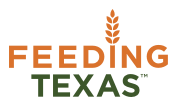For Immediate Release: 6/9/16
Contact: Celia Cole, 512.590.0659 or ccole@feedingtexas.org
The following statement is attributable to Celia Cole, CEO of Feeding Texas:
Today, Texas food banks are calling key members of Congress to voice their opposition to a bill that would reverse years of progress delivering nutritious meals to hungry children.
The House bill, known as “Child Nutrition Reauthorization,” governs school meals, summer and after-school nutrition programs that collectively feed more than three million Texas children every year. As written, this bill would make it harder for those children to access good nutrition.
Feeding Texas recently joined over 750 local, state and national groups in signing a letter opposing this bill. Unfortunately, new provisions in the legislation would deal an even harsher blow to hungry kids.
One provision would pilot the use of "block-grants" to fund school lunches. This proposal would immediately cut funding for participating states and allow them to eliminate federal nutrition standards.
This reduction in funding for school meals would be hard-felt in Texas, where seventeen percent of children live in homes that struggle to afford enough food. Even more dangerous, the bill may signal the beginning of a broader effort to block-grant other anti-poverty programs, undermining their ability to reach Americans in need.
The idea of block grants – granting national program funds to states and letting them make the rules – is not fresh or new. In fact, it was a lynchpin to the problematic welfare reforms enacted by House Speaker Newt Gingrich two decades ago.
Ron Haskins, one of the architects of the Gingrich law, now admits that block-granting “caused me to re-evaluate my confidence that states will do the right thing.” Because when Congress cedes authority over anti-poverty programs, three things happen:
1) The direct link between spending and need is severed, leading to reduced Congressional support over time. This link is critical in nutrition programs like SNAP, which is designed to ramp up automatically if unforeseen natural or economic disasters wipe kitchen tables clean. It is also why the National Journal called SNAP one of America’s most effective programs when it stepped in to feed Texas families devastated by Hurricanes Katrina and Rita.
2) The tempting flexibility introduced by block grants allows states to make politically-driven decisions with critical program funds. This can result in the diversion of dollars from a program’s core mission, sometimes even supplanting previous state spending.
3) The fortunes of struggling families become tied to state and local politics. Gambling with families’ basic needs is no way to advance core national goals like ending child hunger. In particular, states with growing minority communities that historically face hunger – such as Texas – may have the most to lose from capped block-grant funds.
In general, block-grants are a "cut & run" approach that abdicates our national responsibility to tackle tough problems, just because Congress hasn't mustered the will or the creativity to do so.
Serious proposals to end child hunger in America must start with the principle of “do no harm,” and build on past performance. Given the success of programs like school lunch in preventing suffering and helping children perform academically, Congress should advocate boosting access so they can more easily reach children in need.
We support the passage of a child nutrition bill that eschews block-granting, and makes real investments in nourishing the next generation of American leaders.
